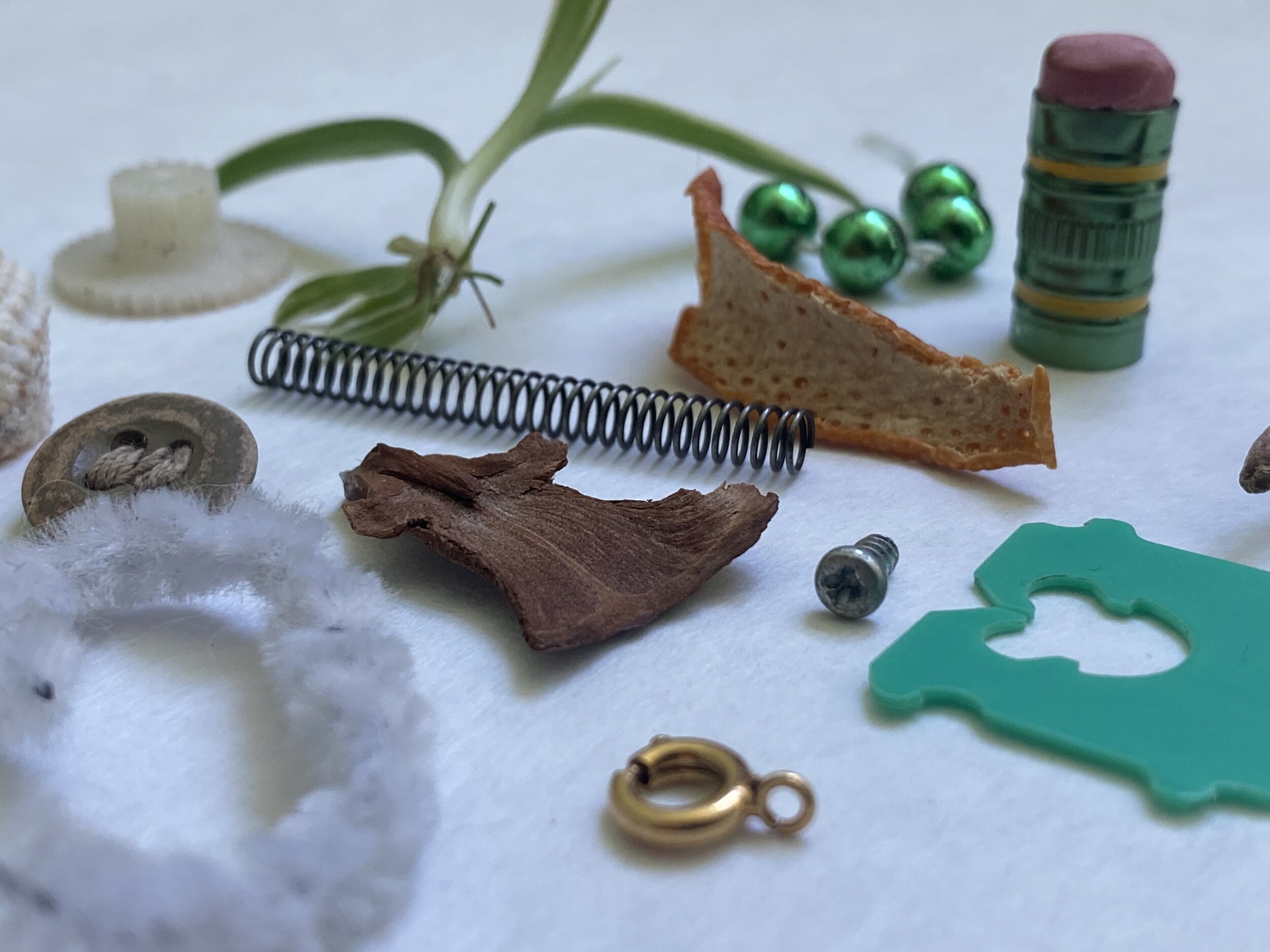Why small objects?
Modest, ordinary things often tossed away or lost from view: piece of thread, twist tie, button, bit of crumpled paper, fuzz, screw. Small fragments of nature: seed, stem, leaf, stone, shell.
Not fanciful or banal. Not romantic or cute or just for fun. Nothing of hobby or accident or effort. Not only for children.
Small objects are everything. And we can find everything we need when we hold one in our hand and offer our full attention.
Ordinary
Small objects are beautifully accessible to everyone. They’re abundantly available and easily lost-found and held-stored-carried. They’re friendly and ground us in our own experiences of daily life. Everyone can find a story to tell and connect to a memory or dream. The more ordinary an object, the more open-ended space there is to notice and wonder.
Play as rigor
Small objects are the perfect playground for practicing play as rigor and rigor as play. I know of no more perfect material to inspire us to collapse the false dichotomy between play-rigor and fully embrace, explore, and dance inside the endless overlap.
Physicality
Small objects, since they are easily held for tangible, physical noticing, open an expansive space to align body-mind-spirit more fully in learning and being. Physicality of objects can help a young child find language to express an idea or feeling, allow an older child to express intricate logic about how objects work inside a system, enable an adult to access memory-dream-emotion more readily for release, and invite anyone to practice more embodied ways of mindfulness and being.
Connection
Small objects hold immensity of energy in their matter. Objects are alive, as nature is alive. As humans, we are of nature, not separate from it. We are of the energy of all matter, including physical objects. Small objects allow us to connect with this energy, be curious about it, and explore more about ourselves in the process. Small objects expand our playground in multidimensional ways.
Immensity
In their smallness, objects offer us their infinity. In turn, they invite us to embrace our own smallness and infinity.
When I say, as I often do, that “Everything we need can be found in a button,” I’m not exaggerating or flippantly playing with poetics. I know from the deepest place of my being that it matters to notice small things. It matters for children’s learning, for educator practice, for parenting, for leadership, for artistry, for all of us, in all that we do and all of who we are.
Hold an object in the palm of your hand. Give your full attention. Notice, wonder, marvel, and delight. Allow yourself to find something beyond what you imagined was possible.
Application
For children:
Name everything you notice (color, size, shape, texture, movement, sound)
Practice notice-to-wonder thinking (I notice__, so I wonder __.)
Play with same and different (Venn Diagrams)
Grow flexible thinking (This might be…; I could maybe try…; I see a __, now a __, now a __; I thought __, now I think __.)
Allow boredom (Stay with your noticing; What else might you find?; Let yourself be with your object.)
For adults:
Find an object, keep it near you, carry it around, get to know it
Talk with your object and listen to what it communicates to you (notice your thoughts/feelings about this)
Hold your object, close your eyes, let your attention rest only with the object, stay for as long as you can
Wonder about your object, then wonder about your wondering (the lenses through which you notice/wonder)
Collect a few objects, gather them together, let yourself play, notice what happens
Learn more about my approach to noticing and how I can support you in your noticing practice:
Listen to an excerpt from a How to Notice book conversation addressing the question: Why small objects?
If you’d like to explore how a practice of noticing small objects can support educator practice and interdisciplinary curriculum experiences for children, please contact me for a conversation.



